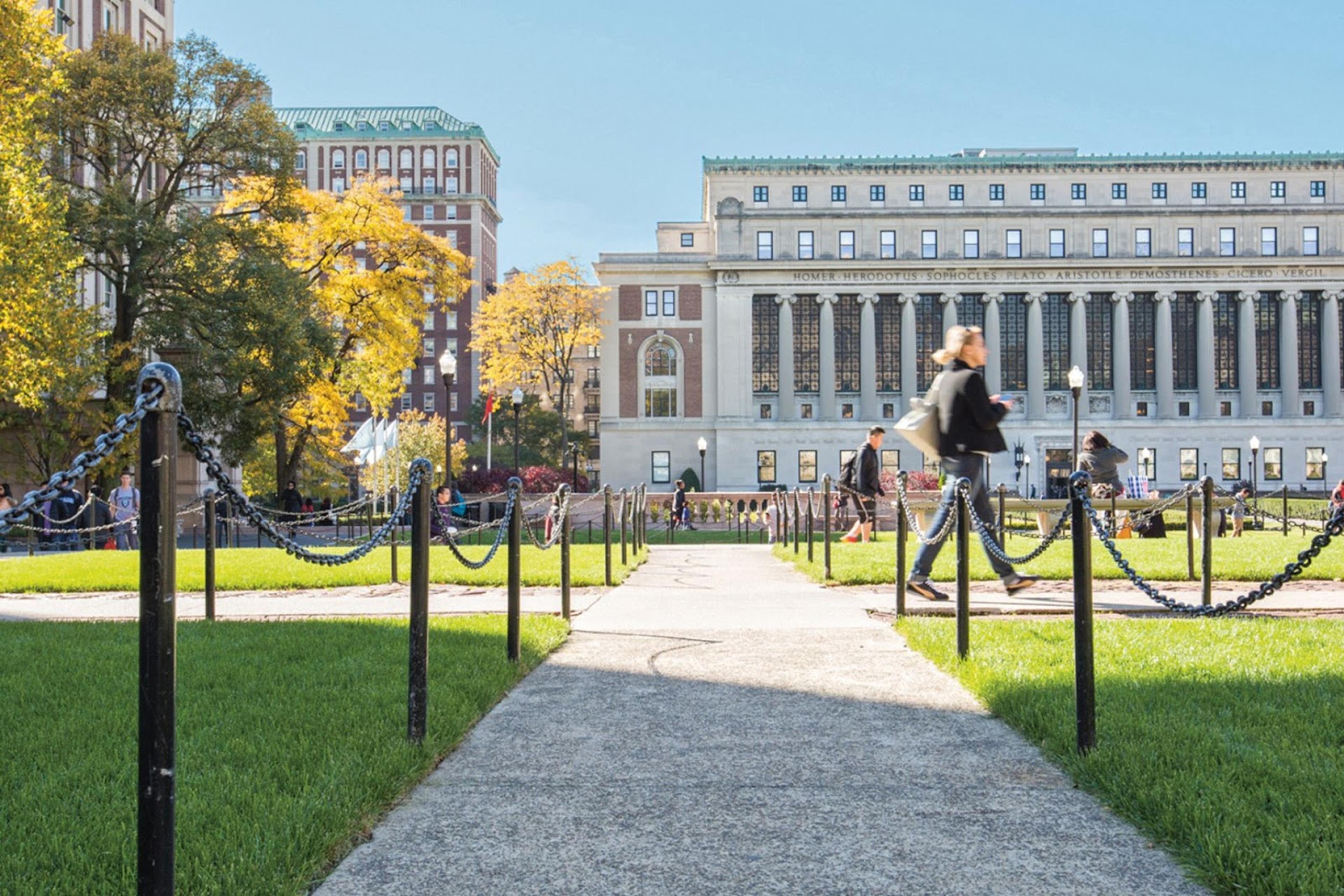Columbia Law School Admission Requirements
If you're considering applying to Columbia Law School, it's important to know the admission requirements.
Posted June 13, 2025

Stay in the loop. Go places.
Join 250,000+ others and receive free resources, exclusive event invites, and personalized support to reach your goals.
Table of Contents
If you're considering Columbia Law School as your choice for pursuing a legal education, it's important to understand the admission process and requirements in detail. Admissions to Columbia Law School are highly competitive with a low admittance rate. But don't let that discourage you. With the right understanding of the admission process and requirements, you can increase your chances of being admitted. So, let's dive in.
Introduction to Columbia Law School
Columbia Law School is one of the oldest and most respected law schools in the United States. It was founded in the year 1858 and is situated in New York City. The law school is renowned worldwide for its exceptional teaching quality, academic rigor, and innovative research. Columbia Law School faculty are thought leaders in the legal field and are committed to providing students with a robust education that prepares them for a range of legal careers.
One of the unique features of Columbia Law School is its location in New York City, which provides students with unparalleled access to legal resources and opportunities. The law school has strong connections with law firms, government agencies, and non-profit organizations in the city, which allows students to gain practical experience through internships and externships. Additionally, Columbia Law School has a diverse student body, with students from all over the world, which creates a rich and dynamic learning environment.
Overview of the Admission Process
The admission process at Columbia Law School is a comprehensive evaluation of each applicant's academic and personal qualifications. Admissions committee members review every application with a holistic approach, analyzing multiple factors including undergraduate academic record, LSAT score, personal statement, letters of recommendation, and extracurricular activities/work experience, among others. The final admission decision is based on comprehensive and fair evaluation of the applicant's entire application.
In addition to the factors mentioned above, Columbia Law School also considers diversity and inclusion as important components of the admission process. The school values a diverse student body and seeks to admit individuals from a variety of backgrounds, experiences, and perspectives. This includes but is not limited to race, ethnicity, gender, sexual orientation, socioeconomic status, and geographic location. The admissions committee carefully considers each applicant's unique background and how they can contribute to the diversity of the student body.
General Admission Requirements
The general admission requirements for Columbia Law School include various academic and personal components. Applicants must have a bachelor's degree from an accredited institution and must have completed their undergraduate degree before commencing the law program. Additionally, the law school requires applicants to submit scores from the Law School Admission Test (LSAT) and register with the Law School Data Assembly Service (LSDAS).
Furthermore, Columbia Law School values diversity and encourages applicants from a wide range of backgrounds to apply. The admissions committee considers factors such as work experience, extracurricular activities, and community involvement in addition to academic achievements and test scores.
It is also important to note that Columbia Law School offers a number of joint degree programs, allowing students to earn a law degree along with a degree in another field such as business, journalism, or international affairs. These programs have their own specific requirements and application processes, so interested applicants should research them thoroughly.
Undergraduate Degree Requirements
While Columbia Law School doesn't mandate any specific undergraduate majors, certain coursework is recommended for all future law students intending to apply to the school. This includes courses related to critical reasoning, analytical writing, and public speaking skills. Additionally, the admission committee looks for undergraduate academic records that demonstrate high academic achievement and intellectual curiosity.
It is also important for prospective law students to gain practical experience through internships or volunteer work in legal settings. This can provide valuable insight into the legal profession and help students determine if law school is the right path for them. Columbia Law School offers a variety of opportunities for students to gain practical experience, including clinics, externships, and pro bono projects.
Furthermore, Columbia Law School values diversity and encourages applicants from a wide range of backgrounds. The admission committee considers factors such as race, ethnicity, socioeconomic status, and life experiences when evaluating applicants. Students who have overcome obstacles or faced adversity in their lives are particularly encouraged to apply and share their stories in their application materials.
LSAT Exam Requirements
The LSAT is a standardized test that assesses skills in reading and analytical reasoning, among other elements, and is required for all law school applicants. The LSAT is offered several times a year and is taken by prospective law students worldwide. Columbia Law School doesn't have a threshold score for LSAT, but scores above 170 put applicants in a competitive position.
It is important to note that the LSAT is not the only factor considered in law school admissions. Admissions committees also review undergraduate transcripts, personal statements, letters of recommendation, and other application materials. However, a strong LSAT score can certainly enhance an applicant's chances of being accepted into their desired law program.
Additionally, it is possible to retake the LSAT if an applicant is not satisfied with their initial score. However, it is important to note that law schools may consider all LSAT scores when evaluating an applicant's application, so it is important to prepare thoroughly and aim for the best possible score on the first attempt.
Application Process and Deadlines
The application process for Columbia Law School is entirely online, and applicants must use the Law School Admissions Council (LSAC) website. The application deadline for J.D. candidates typically falls in February, but it's always advisable to submit your application early. Early application submissions demonstrate an applicant's seriousness and motivate the admissions committee to review their application early.
In addition to the regular J.D. program, Columbia Law School also offers an Early Decision program. This program allows applicants to apply to Columbia Law School as their first choice and receive an admission decision in December, months before regular decision applicants. However, Early Decision is binding, meaning that if an applicant is accepted, they must withdraw all other law school applications and attend Columbia Law School. The Early Decision deadline is typically in November.
Personal Statement and Essays Requirements
One of the most crucial parts of the Columbia Law School application process is the personal statement and essays. These components of the application allow you to showcase your writing ability, convey your personality and their overall readiness to pursue a legal education. Columbia law is looking for proof of your intellectual curiosity, your communication skills, and motivation for a career in law.
When writing your personal statement and essays, it is important to keep in mind that Columbia Law School is looking for applicants who are not only academically qualified but also have a diverse range of experiences and perspectives. Therefore, it is essential to highlight any unique experiences or skills that you possess that would make you stand out from other applicants.
Additionally, it is important to ensure that your personal statement and essays are well-written and free of errors. You should take the time to carefully proofread and edit your work, and consider seeking feedback from others to ensure that your writing is clear, concise, and effectively conveys your message.
Letters of Recommendation Requirements
Columbia Law School requires at least two letters of recommendation from individuals who can attest to your academic skills, character, and potential as a future law student and lawyer. It's highly recommended that the recommendations come from undergraduate professors, but other professionals who know an applicant's potential can do the job. Applicants should request letters well in advance to give their recommenders sufficient time to complete the required document.
Additionally, it's important to choose recommenders who can speak to different aspects of your abilities and character. For example, one recommender may focus on your academic achievements and potential, while another may highlight your leadership skills or community involvement. This can provide a more well-rounded picture of you as an applicant.
It's also worth noting that Columbia Law School does not have a specific form or template for letters of recommendation. However, recommenders should include their contact information and professional credentials, as well as specific examples and anecdotes that support their assessment of the applicant. It's important for applicants to communicate these guidelines clearly to their recommenders to ensure that the letters meet the school's requirements.
Extracurricular Activities and Work Experience Considerations
Extracurricular activities and work experience are crucial components of the application and can provide an admissions committee member with an applicant's work quality and organizational ability. For this reason, prospective students should take time to build their professional contacts and demonstrate leadership qualities in multiple environments – extracurricular competition for work experience enhances your application profile.
Diversity and Inclusion at Columbia Law School
Columbia Law School is committed to diversity and inclusion. The school believes that a diverse, multi-faceted student body fosters a community that reflects the real world, prepares future lawyers for cross-cultural lawyering, and makes for a better learning environment. The school welcomes applicants from different socio-economic backgrounds, race/ethnicity, language, race, national origin, religion, gender identity, sexual orientation, and many other unique circumstances.
Admissions Interview Preparation Guide
After the admissions committee reviews your application, successful applicants may be invited to an interview. Columbia Law School interviews typically take place via video conference, that an applicant can conduct from anywhere worldwide. The best way to prepare for an interview is to research the school thoroughly, practice with colleagues and friends, and be fully prepared to answer any questions related to their application.
Tips for a Successful Application Process
A few pointers that can help you through the application process include setting a timeline for your application job search, working on your LSAT or GRE score, crafting a compelling personal statement that showcases intellectual curiosity and motivation for a career in law, ensuring your application documents are well-designed, refining your resume, and being fully clear with your application package.
Cost of Attendance and Financial Aid Opportunities
Columbia Law School is committed to ensuring that students from all backgrounds can pursue their legal education. The school provides financial aid that covers the full cost of tuition and fees, plus living expenses, for all doctorate students who demonstrate need. It's crucial to apply for financial aid as early as possible in the admission process.
Life at Columbia Law School: Student Experience Overview
Columbia Law School provides a vibrant and comprehensive student experience that fosters intellectual growth and creates a community of law learners that are ready to take on the world. Students have access to legal clinics, moot court and mock trial programs, specialized student societies, and law reviews that develop their critical and analytic thinking and communication, research, and writing skills.
A Columbia legal education is highly valued and opens many doors for its graduates that would not typically be open to others. We hope that this article has provided a complete overview of the admission process, enabling prospective students to make informed decisions about their higher education aspirations. Remember, Columbia Law School is highly regarded and competitive. However, with proper dedication, perseverance, and a smart application strategy, you can increase your chances of admission and make your legal education dreams a reality.












